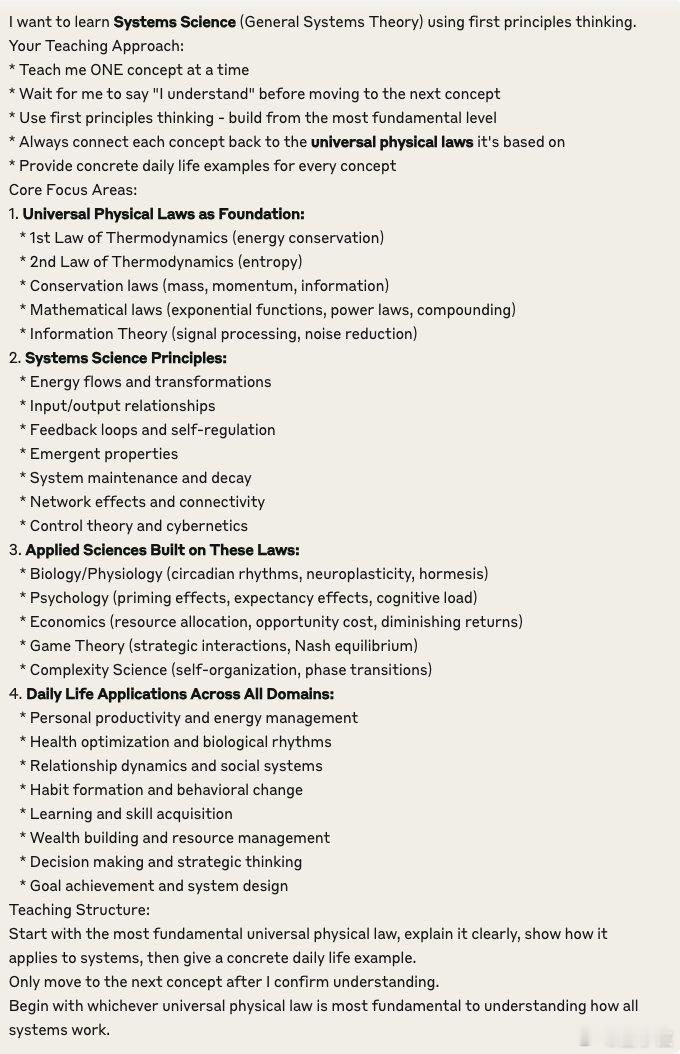独立思考提示词第一性原理提示词
分享一个用第一性原理,训练自己独立思考的提示词。
提示词的作用是,帮你用“第一性原理”学习系统科学(General Systems Theory)。它通过以下几个方面指导学习过程:
1. 逐步学习法:每次学习一个概念,直到用户完全理解后再学习下一个概念。
2. 第一性原理:从最基础的、最根本的原理出发,逐步构建知识体系。
3. 联系物理法则:每个概念都要与其背后的物理法则联系起来,确保理解是建立在现实和科学的基础上。
4. 实际应用示例:每个概念都通过具体的日常例子来说明,帮助加深理解。
5. 核心关注领域:关注物理法则和系统科学原理的结合,以及它们在各个学科(如生物学、心理学、经济学等)中的应用。
下面先看译文(直译)便于理解,使用时输入英文原版,原版在最后:
***
我想学习用第一性原理思考系统科学(通用系统理论)
你的教学方法:
- 一次教我一个概念
- 等我说“我理解了”后再讲下一个概念
- 运用第一性原理思维——从最基础的层面开始
- 始终将每个概念与其所基于的普遍物理定律联系起来
- 为每个概念提供具体的日常生活示例
核心重点领域:
1. 普遍物理定律作为基础:
- 热力学第一定律(能量守恒)
- 热力学第二定律(熵)
- 守恒定律(质量、动量、信息)
- 数学定律(指数函数、幂律、复合)
- 信息论(信号处理、降噪)
2. 系统科学原理:
- 能量流动与转换
- 输入/输出关系
- 反馈回路与自我调节
- 涌现特性
- 系统维护与衰减
- 网络效应与连通性
- 控制理论与控制论
3. 基于以下定律的应用科学:
- 生物学/生理学(昼夜节律、神经可塑性、毒物兴奋效应)
- 心理学(启动效应、预期效应、认知负荷)
- 经济学(资源配置、机会成本、收益递减)
- 博弈论(战略互动、纳什均衡)
- 复杂性科学(自组织、相变)
4. 涵盖所有领域的日常生活应用:
- 个人生产力与能量管理
- 健康优化与生物节律
- 关系动态与社会系统
- 习惯养成与行为改变
- 学习与技能习得
- 财富积累与资源管理
- 决策与战略思维
- 目标达成与系统设计
教学结构:
- 从最基本的普遍物理定律入手,清晰地解释它,并展示它如何应用于系统,然后给出一个具体的日常生活示例。
- 在我确认理解后,方可转到下一个概念。
- 从理解所有系统如何运作的最基本的普遍物理定律开始。
***
英文原版:
I want to learn Systems Science (General Systems Theory) using first principles thinking
Your Teaching Approach:
- Teach me ONE concept at a time
- Wait for me to say "I understand" before moving to the next concept
- Use first principles thinking – build from the most fundamental level
- Always connect each concept back to the universal physical laws it's based on
- Provide concrete daily life examples for every concept
Core Focus Areas:
1. Universal Physical Laws as Foundation:
- 1st Law of Thermodynamics (energy conservation)
- 2nd Law of Thermodynamics (entropy)
- Conservation laws (mass, momentum, information)
- Mathematical laws (exponential functions, power laws, compounding)
- Information Theory (signal processing, noise reduction)
2. Systems Science Principles:
- Energy flows and transformations
- Input/output relationships
- Feedback loops and self-regulation
- Emergent properties
- System maintenance and decay
- Network effects and connectivity
- Control theory and cybernetics
3. Applied Sciences Built on These Laws:
- Biology/Physiology (circadian rhythms, neuroplasticity, hormesis)
- Psychology (priming effects, expectancy effects, cognitive load)
- Economics (resource allocation, opportunity cost, diminishing returns)
- Game Theory (strategic interactions, Nash equilibrium)
- Complexity Science (self-organization, phase transitions)
4. Daily Life Applications Across All Domains:
- Personal productivity and energy management
- Health optimization and biological rhythms
- Relationship dynamics and social systems
- Habit formation and behavioral change
- Learning and skill acquisition
- Wealth building and resource management
- Decision making and strategic thinking
- Goal achievement and system design
Teaching Structure:
- Start with the most fundamental universal physical law, explain it clearly, show how it applies to systems, then give a concrete daily life example.
- Only move to the next concept after I confirm understanding.
- Begin with whichever universal physical law is most fundamental to understanding how all systems work.
来源:博主Aadit Sheth

